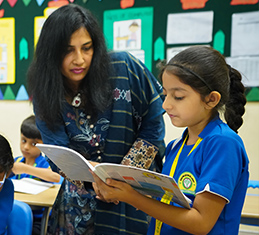download brochure

To Top
Technology's Impact On Children, Good And Bad!
Imagine living without access to smartphones, smartwatches, tablets, or laptops. In the twenty-first century, it must be terrifying. In the age of the tech revolution, gadgets are a part of every aspect of our life and are essential. Our lives now inevitably involve technology.
How will our coming generations cope with technology if we, the elders, are so swamped by it? Certainly, they'll emulate our actions. Each coin has two sides, and technology's impact on kids is no different. Is this influence gradually affecting your child's behaviour? Be mindful of the advantages and disadvantages mentioned by CP Goenka International School in Pune.

POSITIVE IMPACTS
It's essential to acknowledge the positive effects technology can have on children while also acknowledging the negative ones
Educational Opportunities: Technology provides access to a vast amount of educational resources, including interactive learning apps, educational websites, and online courses. These resources can enhance children's learning experiences and cater to individual learning styles and interests.
Improved Communication: Technology facilitates communication and collaboration among children, their peers, and educators. Platforms such as email, video calls, and social media enable children to stay connected with friends and family members, even if they are geographically distant.
Enhanced Creativity: Technology provides children with tools and platforms to express their creativity and imagination. Whether through digital art, music production software, or creative writing apps, technology can inspire children to explore their artistic talents and experiment with new forms of expression.
Access to Information: The internet provides children with instant access to a wealth of information on virtually any topic. This can broaden their horizons, stimulate curiosity, and encourage independent learning as they explore and research subjects of interest.
Skill Development: Using technology can help children develop valuable skills that are essential in today's digital world, such as digital literacy, problem-solving, critical thinking, and coding skills. These skills are increasingly important for academic and professional success in the 21st century.
Increased Engagement: Educational games, simulations, and interactive multimedia content can make learning more engaging and enjoyable for children. Technology can cater to different learning styles and preferences, helping to keep children motivated and interested in learning.
Empowerment and Self-expression: Technology provides children with platforms to share their ideas, opinions, and experiences with a global audience. Blogging, vlogging, and social media platforms enable children to express themselves creatively, advocate for causes they care about, and connect with like-minded individuals.
Preparation for the Future: In an increasingly digital world, exposure to technology from a young age can help children develop the skills and competencies they need to succeed in future academic and career endeavors. Familiarity with technology and digital tools can give children a competitive edge in a rapidly evolving job market.
It's important for parents, educators, and caregivers to balance children's use of technology with other activities and to promote responsible and mindful use. By harnessing the positive impacts of technology while mitigating its negative effects, children can fully benefit from the opportunities that technology offers.
NEGATIVE IMPACTS
Technology can indeed have negative impacts on children, particularly if not used responsibly or in moderation. Here are some of the potential negative impacts:
Physical Health Issues: Excessive use of technology, particularly screens such as smartphones, tablets, and computers, can lead to physical health problems such as obesity, poor posture, and eye strain. Sedentary behavior associated with prolonged screen time can contribute to a lack of physical activity.
Mental Health Concerns: Excessive screen time and social media usage have been linked to mental health issues such as anxiety, depression, and low self-esteem. Constant exposure to unrealistic standards on social media platforms can negatively impact children's self-image and lead to feelings of inadequacy.
Sleep Disruption: The use of electronic devices, particularly before bedtime, can disrupt children's sleep patterns. Exposure to the blue light emitted by screens can interfere with the production of melatonin, a hormone that regulates sleep, leading to difficulty falling asleep and poorer quality sleep.
Cyberbullying: The prevalence of technology and social media platforms has given rise to cyberbullying, which can have serious consequences for children's mental and emotional well-being. Cyberbullying can occur through various online channels, including social media, messaging apps, and online gaming platforms, and can result in feelings of isolation, anxiety, and depression.
Negative Impact on Academic Performance: Excessive use of technology, particularly for non-educational purposes, can negatively impact children's academic performance. Spending too much time on screens can detract from time spent on homework and studying, leading to decreased academic achievement.
Addiction and Dependency: Excessive use of technology can lead to addiction-like behaviors, where children may struggle to control their use of electronic devices and experience withdrawal symptoms when not using them. This can interfere with other aspects of their lives, including academic performance, relationships, and physical health.
Privacy and Safety Concerns: Sharing personal information online, such as their location, photos, or contact details, can have risks that children may not be aware of, which can lead to privacy and safety concerns. This can make them vulnerable to online predators, identity theft, and other privacy and safety concerns.
It's crucial for parents, educators, and caregivers to comprehend the potential negative effects and to encourage children to use technology in a responsible and balanced manner. This can involve setting limits on screen time, monitoring children's online activities, promoting digital literacy and safety skills, and encouraging alternative activities such as outdoor play, hobbies, and face-to-face social interactions.










